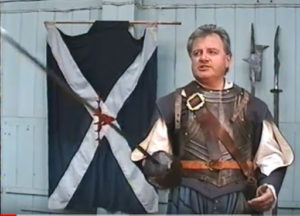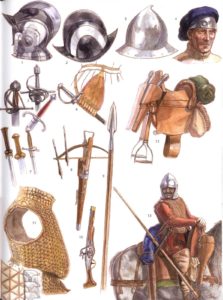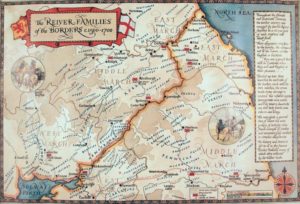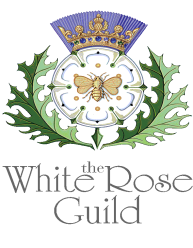by John Sadler
 One of the most notable historians of Anglo-Scottish Border conflicts, John Sadler has published a number of books on the subject and is also a successful lecturer, heritage consultant, historical interpreter and battlefield tour guide. ‘From an early age I have been obsessed with the highlands and borders.’ he says, ‘Since then I have travelled, walked, ridden and driven over most of the ground and looked at every battlefield, hillfort, broch, dun and castle.’
One of the most notable historians of Anglo-Scottish Border conflicts, John Sadler has published a number of books on the subject and is also a successful lecturer, heritage consultant, historical interpreter and battlefield tour guide. ‘From an early age I have been obsessed with the highlands and borders.’ he says, ‘Since then I have travelled, walked, ridden and driven over most of the ground and looked at every battlefield, hillfort, broch, dun and castle.’
Sadler regularly lectures at The National Army Museum, Imperial war Museum, RMA Sandhurst, Heriot Watt University, Society of Antiquaries of Newcastle upon Tyne, The Literary and Philosophical Society, Newcastle, Durham University, the DLI Museum & Art Gallery and contributes to many military and historical journals as well. He is a Fellow of the Royal Historical Society, a Fellow of Scotland’s Society of Antiquaries, a graduate Holocaust Fellow of the Imperial War Museum and a member of Equity.
STEEL BONNETS
Episode 4
Raid of the Reidswire
The seventh of July the smith to say,
At the Reidswire the tryst was set;
Our wardens they affixed the day
And as they promised, so they met,
Alas that day I’ll never forgett!
Was sure sae feard, and then sae faire
They came theare justice for to gett,
Will never green to come again.
 Days of Truce had been a feature of the administration of border justice since the mid thirteenth century when the warden system was formally established. In theory each march warden was to meet with his opposite number once a month, tho’ in practice this rarely occurred due to bad weather, hostilities between the two nations or prevarication on the warden’s part.
Days of Truce had been a feature of the administration of border justice since the mid thirteenth century when the warden system was formally established. In theory each march warden was to meet with his opposite number once a month, tho’ in practice this rarely occurred due to bad weather, hostilities between the two nations or prevarication on the warden’s part.
The protocol was exact, both parties, mounted and fully arrayed (i.e. harnessed for war) would approach the agreed meeting place. The Reidswire, (“swire” = a narrow neck of land), formed ideal ground. Before either warden met the two parties would eye each other up then an English rider would spur forward to ask ‘assurance’ of the Scottish warden. Once this was given the process was reversed then the two sides, warily, advanced.
Traditionally meetings were held actually in Scotland – it was said that Scottish wardens were reluctant to enter England after one of their number Sir Robert Ker of Cessford was killed by Bastard Heron at a Truce day in 1508. The assurance, or guarantee of peaceful intent was to hold from that sunrise to next evening sunset to allow all present to reach home in one piece, (the most notorious breach of this observance being the apprehension of Kinmont Will Armstrong in defiance of convention in 1596).
Much business of the day revolved around the hearing of complaints from both sides.
These indictments or bills were lodged beforehand by plaintiffs and heard on the day.
Often a jury of 12, six from each side was empanelled to decide the matter or a decision could be achieved on the warden’s oath or the oath or ‘avower’ of some prominent man effectively acting as the defendant’s guarantor. Trials were noisy, lively and contentious. Most did not come with entirely clean hands and if a bill was proven or ‘fyled’ then the defendant had to agree compensation, if the accusation failed and the defendant found ‘cleane’ then no redress was due. Compensation monies could be calculated on the penal basis of ‘double and sawfey’ – 3x the value of the goods lifted. Levels of compensation were defined at various times. In 1563 it was agreed as follows: An ox = 40s, cow = 30s, young ox or cow = 20s, sheep/swine = (around) 6s.
 These days of truce were occasions for much imbibing, betting and gaming. Horse races were held and everyone dressed in their finery. Hearings were held in the open and the crowd no doubt contributed vociferously. Virtually all present, from both sides of the line knew each other, they’d drunk, fought, ridden and wagered many times before. Everyone went armed; drink was a major factor in disturbances. Frequently the wardens themselves, especially men of the cut and temperament of old John Forster were far from impartial. Scott of Buccleuch (“The Bold Buccleuch”), Ker of Cessford and Lords Home and Maxwell were all active in border politics.
These days of truce were occasions for much imbibing, betting and gaming. Horse races were held and everyone dressed in their finery. Hearings were held in the open and the crowd no doubt contributed vociferously. Virtually all present, from both sides of the line knew each other, they’d drunk, fought, ridden and wagered many times before. Everyone went armed; drink was a major factor in disturbances. Frequently the wardens themselves, especially men of the cut and temperament of old John Forster were far from impartial. Scott of Buccleuch (“The Bold Buccleuch”), Ker of Cessford and Lords Home and Maxwell were all active in border politics.
The ‘Raid’ of the Reidswire in 1575 was due to be one of the more memorable meetings. 7th July and Sir John Forster met his Scottish counterpart Sir John Carmichael, Keeper of Liddesdale. It’s unclear if the two men had already disagreed but matters, from the outset were unlikely to remain cordial. The meeting took place at the Reidswire and several hundred attended from both sides of the line.
Matters begin amicably enough – then a bill was brought against an absentee defendant, named Farnstein. The case was proved, ‘fyled’ but Sir John prevaricated over the man’s non appearance. Angry words followed between the two lawmen who like their followers, had been drinking steadily. Carmichael may have been overly aggressive and Sir John was haughty and dismissive, reminding the younger man of his inferior status.
Carmichael then speak out plainlike
And cloke no cause for ill or good;
The other answering him as vainlie
Began to reckon kin and blood
He raise and raxed him where he stood
And bade him march with his marrows.
3
 The rank and file happily joined in the abuse and then, it is said, the Tynedale men loosed several arrows into the ranks of the Scots and a melee ensued: Then Tindaill heard them reason rude, And they loot off a feight of arrows. The two officials, rapidly sobering, attempted to calm things down but the Tynedale men laid on and the Scots were in difficulties until the Jedburgh men, arriving late, came up as reinforcements.
The rank and file happily joined in the abuse and then, it is said, the Tynedale men loosed several arrows into the ranks of the Scots and a melee ensued: Then Tindaill heard them reason rude, And they loot off a feight of arrows. The two officials, rapidly sobering, attempted to calm things down but the Tynedale men laid on and the Scots were in difficulties until the Jedburgh men, arriving late, came up as reinforcements.
The fight was long and hard but the English were eventually worsted. Many dead and wounded were left on both sides. Forster was temporarily taken prisoner as was his son in law Lord Francis Russell and Cuthbert Collingwood. The English deputy warden Sir George Heron was amongst the dead.
Move forward to 2005, in North Tynedale and the recreated Tarset Reivers prepare to re-enact the fray. Helpfully this is funded by the Festival of the Tyne whose coffers have armed and accoutred a fresh batch of dales-men and women. There’s plenty of imbibing and even folk music this time around with belligerent housewives and loud-mouthed wardens. There’s a telling resonance amongst these ancient hills, many present bear the same names as would be heard in 1575 – Charlton, Robson, Dodds, Milburn, Ridley et al.
These latter day reivers drawn from the populace have been training during the early summer months, swinging facsimile broadswords with lusty abandon. It’s a fair tribute to Ulfric, master sword-smith of Haltwhistle that the blades stand up. Swordplay, in the dramatic sense, requires all the flourishes of the duellist with a keen eye for health and safety. You aim the blows with fearful intent then pull any force at the last moment before contact. This means if anything goes wrong, an accidental slip a defective blade that shatters at the stroke (and they do from time to time) and you opponent still has the use of all limbs.
After a very long, hot interval with ground hardened to iron, it rained on the day but Tynedale is used to that. A score of new reivers took to the field, Forster and Carmichael entered the ring and it was business as usual, one local breeder had arrived on horseback with his current version of the border hobilar which, surprisingly is part American quarter horse and there’s nothing quite like seeing these fellows on horseback. Everything about a reiver makes sense when he’s in the saddle.
Of ballads and balladry
The disaster at Flodden has always exercised a particular pull on Scotland’s collective awareness and the whole sorry episode was seriously romanticised by Scott in the nineteenth century. The poem entitled Flowers of the Forest was collected by Scott but written by a Mrs Cockburn. Although not necessarily relating to the battle it has become a kind of anthem for Flodden:
I’ve seen the forest adorn’d of the foremost,
With flowers of the fairest, both pleasant and gay;
Full sweet was their blooming, their scent the air perfuming,
But now they are wither’d, and a’wede awae.
 Border Ballads are justly famous, and Scott collected many of them in the early years of the nineteenth century. It has frequently been lamented that no-one from an earlier period thought to compile a collection of the ballads of his day, so many may well have been lost altogether. The earliest ballads, Battle of Otterburn and Chevy Chase, are probably from the fifteenth century, though the majority appear to belong to the sixteenth, many may have originated on the Scottish side, though some are clearly Northumbrian.
Border Ballads are justly famous, and Scott collected many of them in the early years of the nineteenth century. It has frequently been lamented that no-one from an earlier period thought to compile a collection of the ballads of his day, so many may well have been lost altogether. The earliest ballads, Battle of Otterburn and Chevy Chase, are probably from the fifteenth century, though the majority appear to belong to the sixteenth, many may have originated on the Scottish side, though some are clearly Northumbrian.
The Fair Flower of Northumberlande tells of the infatuation of one of the Earl of Northumberland’s daughters for a captive Scottish knight. In the ballad, the resourceful girl organises her lover’s escape and flees with him back to Scotland only to discover that he’s already married with five children! Another from Northumberland is The Death of Parcy Reed, which is wonderfully gory. The luckless Percy, laird or owner of Troughend, is betrayed to his enemies, (the vengeful Croziers), by the Hall family of Redesdale. He was done to death in a rather lingering and horrible manner, his hands and feet cut off and so on.
The ballads deal with subjects both violent and romantic: women left widowed, tragic love affairs that end in death, battles, duels, skirmishes and general bloodletting.
All very dramatic! Cattle raiding, the reivers’ main occupation, also gets its fair share of attention as in Jamie Telfer of the Fair Dodhead:
It’s I Jamie Telfer, o’ the fair Dodhead,
And a harried man I think I be!
There’s naething left at the fair Dodhead,
But a waefu’ wife and bairnies three.
5
The unfortunate Jamie was relieved of his cattle and indeed everything else by the English captain of Bewcastle. Where is this? In the sixteenth century the fort at Bewcastle, now a ruined shell, was a very important garrison. Jamie sought the aid of his neighbours to recover the cattle, which they duly did after a sharp fight:
O mony a horse ran masterless,
The splintered lances flew on hie;
But or they wan to the Kershope ford,
The Scottes had gotten the victory.
The ballad exults in the tumult of battle and lingers on the ghastly injuries sustained:
The captain [of Bewcastle] was run through the thick of the thigh,
And broken was his right leg bane;
If he had lived this hundred years,
He had never been loved by woman again.
Nasty.


